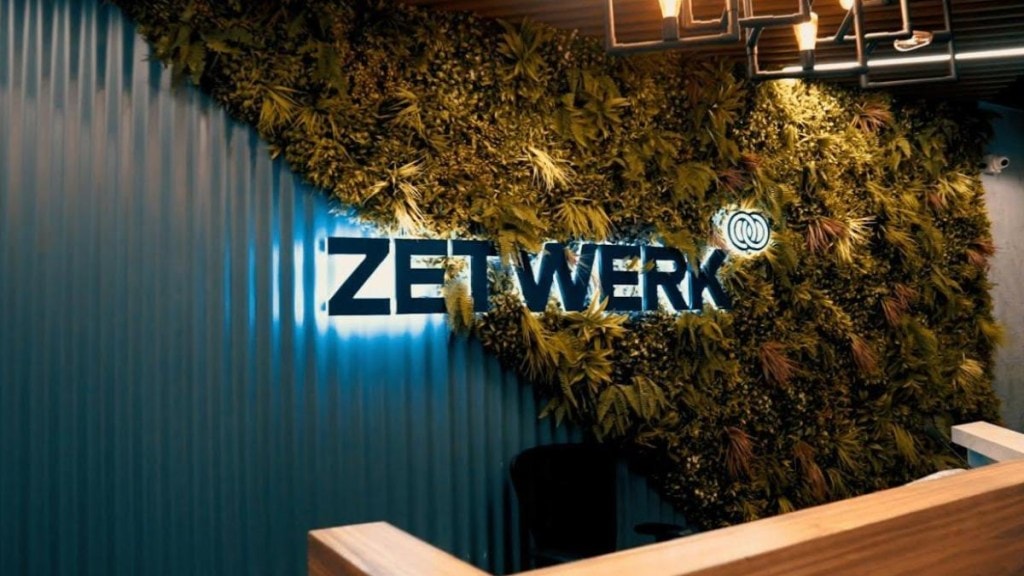Zetwerk Manufacturing is on a roll. It’s helping the country’s top corporations build bridges and power plants and manufacture bullet trains and precision goods. The managed network for contract manufacturing now boasts of an order book that is nudging Rs 13,000 crore. And its roster of clients includes blue-chip names like Larsen &Toubro, Siemens and NTPC Green.
Zetwerk’s skills lie in converting the design provided by the client into a product or structure. Once it obtains what is called a design file from the client — essentially the dimensions and materials — it assesses which manufacturers have the technical ability and capacity to do the work. “Accordingly we distribute the orders across the units in a reverse-bidding process on the platform,” explains co-founder and CEO Amrit Acharya.
What Zetwerk has been able to do is to tap more supply in manufacturing capacity. “We are aggregating supply and are, therefore, able to bid for big contracts which an individual manufacturer may not be able to do. Also, not all industries in India are vertically integrated which creates opportunities. Today, the company works with some 15,000 manufacturing units. “We believe the supply chain ecosystem is at an inflection point and if we are in early we can gain from this,” says Acharya.
The model scores over a conventional manufacturing process in its ability to speed up execution. The distribution of orders across several units and the monitoring of the process on the platform help ensure timely delivery. “The progress of any order is tracked on the platform to check who is on schedule or who is lagging. While the manufacturing is being done at the factories, there are many other steps in the process and that’s where there was something missing, a gap. That’s why we started the business,” says Acharya.
He adds that while customers certainly want quality, they are extremely demanding about getting the delivery on time. The demand for such a service, according to him, is far outstripping the supply. As more corporations adopt a China-plus-one strategy, they are looking for an alternative manufacturing locations to diversify their supply chains and are exploring India’s component manufacturing ecosystem. Currently, Zetwerk caters to orders in sectors including renewables, oil & gas, aerospace electronics and defence. Between them, electronics, renewables and precision manufacturing currently bring in about 40% of the business.
Acharya says Zetwerk has been able to win orders despite the competition. “In the case of NTPC Green for instance, it was a tender process and we were the L1 bidder, bidding against many competitors,” he says, adding private sector companies have their own processes. However, Zetwerk is completely in control of the back-end where it distributes the orders through a reverse auction.
While the company has posted operating profits in the last two years, Acharya says the investments will continue, especially in building the management team, bringing in talent and upgrading the software. A case in point is the appointment of Josh Foulger, the former head of Foxconn arm Bharat FIH. Foulger has been taken on board to run the electronics business.
Zetwerk is also working to scale up the exports which account for about a fifth of the business. The business –largely renewable and precision components – is now three years old and brings in margins that are often double of those earned locally. Currently, its biggest market is the US. “Most of our US customers are first-time buyers from India and have moved some of their production from China. They are keen to diversify their production base and so demand is growing,” says Acharya. Zetwerk is working to add value to its services. Earlier this year, a consignment shipped from India to a client in the US, was forced to take a detour when it reached the Suez Canal, owing to the Red Sea crisis. The consignment was delayed but Zetwerk’s real-time tracking system saved the day, alerting and informing the client about the whereabouts of the vessel.
Since then, Zetwerk has tried to service orders from the US by producing in Mexico where it now has created capacity. “This may be a little more expensive but customers are willing to pay. We are trying to increase the resilience of the client’s supply chain and customers value this,” says Acharya.
The big challenge, of course, is to ensure that the production standards are high in a country where quality is not always the top priority. Where Zetwerk believes it can do a better job than its partners, it executes the orders in-house. When other units are involved, critical quality checks are conducted and all data are institutionalised. The weaker units have been weeded out. Acharya claims the process has been refined over time and the good suppliers identified. “We are working with 15,000 units today but we have checked out more than 35,000-40,000 units across the country,” he says. But in an ecosystem in which manufacturers, especially the smaller units, are often firefighting it is not easy to get the work done, let alone on time. Wherever possible, Zetwerk steps in to help with logistics or other issues. In their well-being lies its future.

